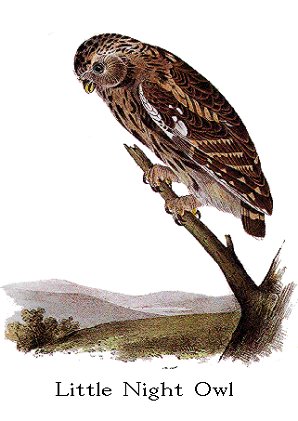
|
Family III. STRIGINAE. OWLS.
GENUS I. SURNIA, Dumeril. DAY-OWL. |
Next >> |

Family |
LITTLE NIGHT OWL. [Little Owl.] |
| Genus | SURNIA PASSERINA, Linn.
[Athene noctua.] |
The specimen from which my drawing of this bird was taken, was procured near Pictou in Nova Scotia, by my young friend THOMAS M'CULLOCH, Esq., who
assured me that it is not very uncommon there. How far southward it may proceed
in winter I have not been able to ascertain; nor have I ever met with it in any
part of the United States. It is also said to be abundant in Newfoundland, and
not rare in Labrador. My specimen is a female, and was shot in winter.
STRIX PASSERINA, Linn. Syst. Nat., vol. i. p. 133.
CHOUETTE CHEVECHE, Strix passerina, Temm. Man. d'Orn., p. 92.
LITTLE NIGHT OWL, Strix passerina, Aud., vol. v. p. 269.
Female.
Tail rather short, arched, nearly even; wings almost as long as the tail,
the outer four quills cut out on the inner web, the outer five sinuated on the
outer; filaments of the first free and slightly recurved, as are those of the
second and third beyond the sinus. General colour of upper parts
chocolate-brown, the feather of the head with an oblong median white mark; hind
neck with very large white spots, forming a conspicuous patch; on the back most
of the feathers with a single large subterminal roundish spot, as is the case
with the scapulars and wing-coverts, most of which, however, have two or more
spots; quills with marginal reddish-white spots on both webs, the third with six
on the outer and four on the inner, with two very faint pale bars toward the
end; the tall similarly marked with four bands of transversely oblong,
reddish-white spots; feathers of the anterior part of the disk whitish, with
black shafts, of the lower part whitish, of the hind part brown, tipped with
greyish-white; a broad band of white crossing the throat, and curving upwards on
either side to the ear; a patch of white on the lower part of the fore-neck;
between these a brownish-grey band. Lower parts dull yellowish-white, each
feather with a broad longitudinal band of chocolate-brown; abdomen and lower
tail-coverts unspotted; tarsal feathers dull white.
Female, 10 1/2; wing from flexure 6 1/4; tail 3 1/2.
| Next >> |